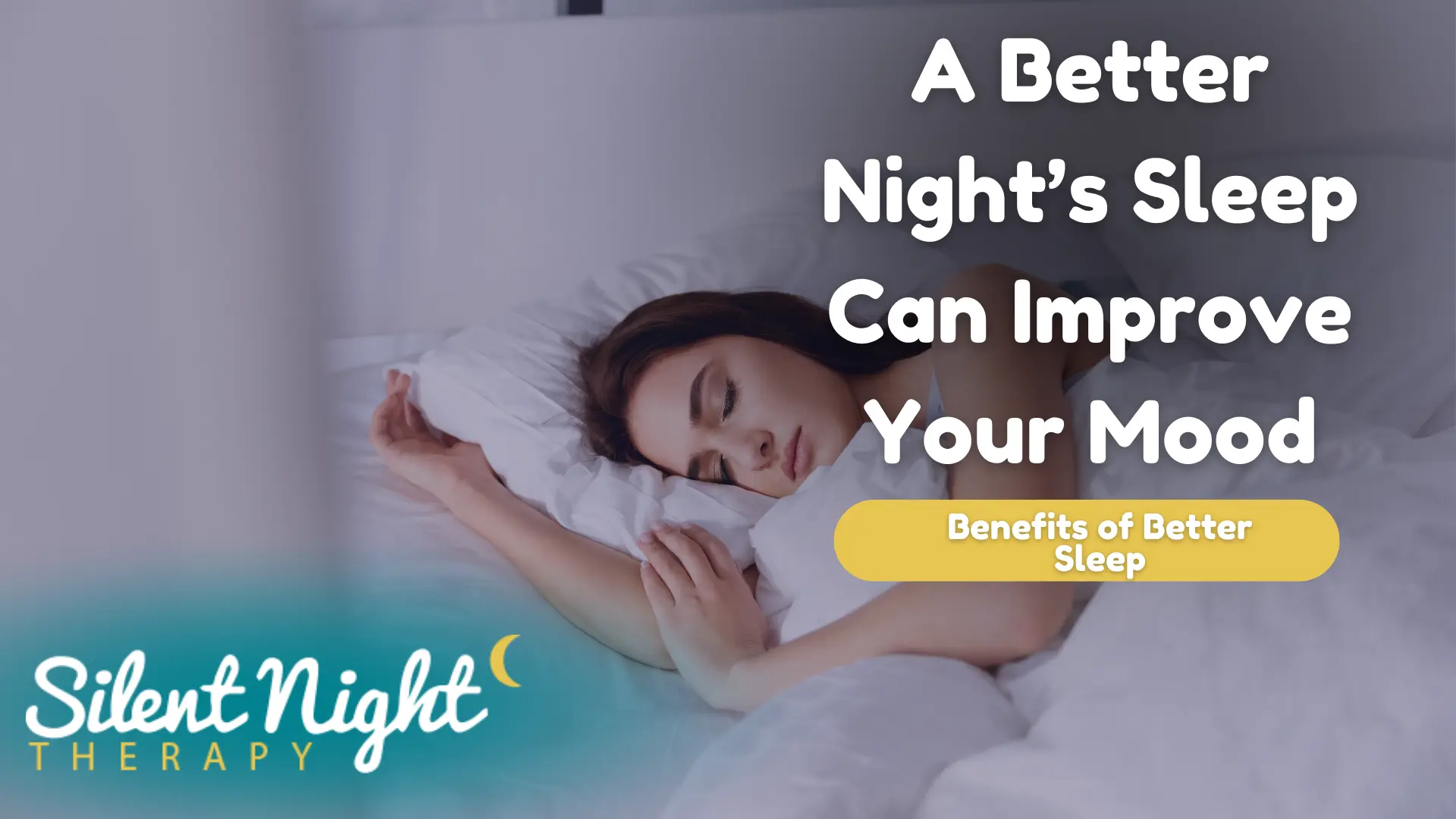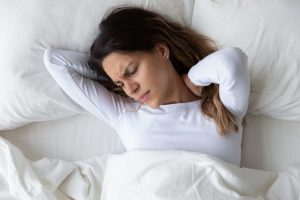 Poor quality sleep can negatively affect your mood. At Silent Night Therapy, we understand the challenges you face when you don’t get enough sleep. You feel tired, sluggish, and irritable. Fortunately, we might be able to help you get a better’s night sleep.
Poor quality sleep can negatively affect your mood. At Silent Night Therapy, we understand the challenges you face when you don’t get enough sleep. You feel tired, sluggish, and irritable. Fortunately, we might be able to help you get a better’s night sleep.
Sleep apnea is a common sleep-related breathing disorder. It causes repeated episodes of stopped breathing while a person sleeps. When that happens, it can disrupt sleeping patterns and cause mood changes and other issues. Treatments are available to reduce snoring and manage the symptoms of sleep apnea.
A good night’s sleep can instantly boost your mood. It recharges the body, relieves stress, and promotes good mental health. When anything disturbs you as you sleep, you wake up feeling fatigued and typically experience more emotional and negative reactions than positive ones.
The New York better sleep specialists of Silent Night Therapy know your demanding schedule could get in the way of sleeping soundly. When you’re stressed, taking care of your family, or working long hours, you have limited opportunities to get the rest you need. However, you should prioritize quality sleep, so your mood doesn’t suffer.
Call Silent Night Therapy at (631) 983-2463 to determine whether you have sleep apnea and get started on a treatment plan to improve your sleep and mood.
Dynamic Toc TestTypes and Symptoms of Sleep Apnea
Sleep apnea affects around 22 million people in the United States. Approximately 80 percent of cases involving moderate to severe symptoms go undiagnosed. It’s vital to understand what sleep apnea is and how it affects your overall well-being. With the proper treatment, you can sleep better, boost your mood, and experience various benefits to your physical and mental health.
At Silent Night Therapy, we treat the three major types of sleep apnea:
- Central sleep apnea – Central sleep apnea results in the brain not transmitting signals to the muscles that control breathing needs. When that happens, it can cause a person to stop and start breathing repeatedly as they sleep.
- Obstructive sleep apnea – The muscles at the back of the throat relax in people suffering from obstructive sleep apnea. These relaxed muscles cause the tongue to block the airway, preventing sufficient air from flowing to the lungs.
- Complex sleep apnea syndrome – Complex sleep apnea syndrome causes obstructive sleep apnea and central sleep apnea symptoms.
If you know the signs of sleep apnea, you can receive the correct diagnosis and find the right solution to your problem. The most common symptoms of sleep apnea include:
- Loud snoring
- Trouble paying attention while awake
- Irritability
- Difficulty staying asleep (insomnia)
- Morning headaches
- Gasping for air while sleeping
- Waking up with a dry mouth
- Excessive sleepiness while awake
- Repeated episodes of stopped breathing when sleeping
Do not hesitate to call Silent Night Therapy if you suffer from any symptoms of sleep apnea. We use multiple diagnostic tools to determine whether sleep apnea is the culprit for your poor quality sleep.
Understanding the Link Between Sleep and Mood
 Many people admittedly get less sleep than they need. Unfortunately, inadequate sleep significantly affects mental health. It can cause anger, irritability, and depression. It’s also more challenging to cope with stress when you’ve had insufficient sleep.
Many people admittedly get less sleep than they need. Unfortunately, inadequate sleep significantly affects mental health. It can cause anger, irritability, and depression. It’s also more challenging to cope with stress when you’ve had insufficient sleep.
When you spend your days feeling tired, you might have a shorter fuse. Unpleasant emotions are more common, and anything could trigger a fit of rage or emotional meltdown. Additionally, sleep deprivation decreases the likelihood of healthy eating, getting enough exercise, and engaging in enjoyable activities.
Over time, an impaired mood becomes a daily habit. Instead of searching for a way to resolve the issue you face, you get used to feeling tired and unhappy. Many people avoid interactions with family and friends. It’s also common to lounge around the house because of a lack of energy to participate in life.
How to Diagnose Sleep Apnea
Sleep apnea could be the reason for your poor sleeping patterns. At Silent Night Therapy, we use various methods to diagnose sleep apnea.
We could perform a sleep test to determine whether you suffer from sleep apnea symptoms or another breathing disorder. You will be hooked up to a machine in a private room during the test. While you sleep, the machine will monitor your body and different activities, such as:
- Breathing patterns
- Heart
- Lungs
- Blood oxygen level
- Brain
- Arm and leg movement
We also offer an at-home test so you can undergo a sleep study from the comfort of your own bed.
Available Options for Treating Sleep Apnea
Treating sleep apnea is not a one-size-fits-all solution. You might need to try a few treatments before finding the one that works for you.
At Silent Night Therapy, we offer customized treatment plans based on the type of sleep disorder you have and your specific needs. The treatment options we offer include:
- Behavioral – Your lifestyle might be the reason you’re not getting a good night’s sleep. You might alleviate your symptoms by making changes, such as maintaining a healthy weight. Exercising and quitting smoking can also improve your sleep quality.
- Surgery – With extreme cases of sleep apnea, surgery
 might be the only option. However, it’s often the last resort to alleviate symptoms. Common procedures involve removing tissue from the back of the mouth and top of the throat or repositioning the jaw to create more space behind the tongue.
might be the only option. However, it’s often the last resort to alleviate symptoms. Common procedures involve removing tissue from the back of the mouth and top of the throat or repositioning the jaw to create more space behind the tongue. - Oral appliance therapy – An oral device can keep the airway open as you sleep to relieve snoring and reduce sleep apnea episodes. It’s an excellent option if another treatment, such as a CPAP machine, hasn’t been successful.
Silent Night Therapy offers four types of oral appliances for the treatment of sleep apnea:
- Elastic Mandibular Advancement – The EMA is the smallest device we use to treat patients suffering from sleep apnea. This appliance has individual trays with straps varying in length and flexibility. It allows for lateral jaw movement and mandibular advancement.
- Dynaflex Dorsal – This is one of the most popular oral appliances we offer to treat patients with obstructive sleep apnea. Two pieces provide comfort to the wearer while maintaining lateral movement of the jaw as they sleep.
- The Adjustable Herbst – The Adjustable Herbst consists of two pieces with hinged mechanisms holding them together. Advancement screws on the mechanisms enable titration and mandible advancement.
- Respite Blue+ – This device is comfortable to wear while sleeping in any position. The interlocking wings and dual block design open the airways for easier breathing.
Contact Us
Since 1983, Silent Night Therapy has helped our patients achieve better quality sleep. If you’re not sleeping soundly and experience adverse effects on your mood, contact us immediately.
We can perform a sleep study and diagnose you in our office. Our many treatment options can alleviate your sleep apnea symptoms, so you don’t have to struggle to get a good night’s sleep any longer.
For a free sleep consultation with an experienced and trusted sleep specialist, call us at (631) 983-2463 right now.